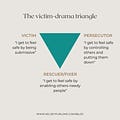Exiting the Victim Drama Triangle
When we remove ourselves from ego-driven power games, we free ourselves wholly to experience more of the good stuff and less of the, well, bullshit.
I’ve been showing this Victim Drama Triangle model to my clients and students for the last two years. I have watched them understand the roles of the triangle, take accountability for the roles they play in their own lives, and implement exit strategies to great success.
When we take accountability for the way that we relate, it transforms our entire world because we begin to feel safe and empowered through our connections.
Relationships Change
Partnerships evolve exponentially. Friendships blossom. Intimacy deepens. Careers skyrocket. Income rises. Experiences peak all around. The baseline mood of our lives is raised not only for ourselves as individuals, but for everyone who enters our sphere. We become, truly, the master of our reality. Infinite.
It doesn’t mean that there is never any friction in our day to day. It doesn’t mean we never have a disagreement, or that we are never disappointed. It doesn’t mean nothing bad ever happens.
It means that we have the personal power to navigate whatever comes our way with integrity and not get sucked into games that do not serve our essence.
Keys to Understanding the Triangle
Once we’ve engaged in it, we move around the triangle until 1 person chooses to step out of it. We step out of it by moving into clear and healthy communication patterns.
It’s important that you enter into this from a place of self-acceptance and taking full accountability. There’s no space for guilt or shame in this conversation, because there’s nothing to be ashamed or guilty about.
What’s past is past, and we get to start fresh in any given moment.
We each play all of the roles, but we tend to have a go-to entry point in each of our relationships.
You may be the rescuer in your familial dynamic, a victim in your work, and a persecutor in the relationship with your best friends.
Here is a quick synopsis of the roles:
Rescuer
“Saves” people they see as vulnerable. Is an enabler and can be a martyr. Generally does over 50% of the work. Offers unsolicited “help” and “advice”. Feels responsible for others, making them feel good and fixing their problems. Makes sacrifices for others and discounts personal needs. Feels validated and vindicated for being such a “good” person. Sees self as rescuer, hero. Sees others as less capable or helpless. Feels guilt when problems can’t be solved. Keeps victims dependent. Rescuing creates a sense of being capable, worthy and “safe” because they’re needed. Rescuers often feel resentment.
Persecutor
Often feels powerless and so exerts their power over others in order to feel in control and safe. Is driven by anger and resentment. Destructive, dominating and negative. Withdrawal (hot/cold energy, silent treatment), blaming “it’s all your fault”, lashing out, critical, judgmental, uses guilt to control. “Me first” attitude; rigid in thinking- I’m right you’re wrong (I’m the parent/“because I said so”). Dominating and oppressive. Refusal to take accountability for wrongdoings.
Victim
Overwhelmed by their own vulnerability, doesn’t take responsibility for own situation. There is a refusal to own themselves. They play helpless from a place of “poor me,” “save me,” self-pity, blaming others/the system/the world. Feels oppressed, powerless and ashamed
Won’t solve problems or make decisions to help themselves. Dependent on others. Inability to self-soothe. Seeks external validation. Seeks someone to rescue, or save them because they see themselves as unworthy or incapable and don’t trust themselves. Unwillingness to lead themselves. Avoids responsibility and taking accountability for themselves. Views self as less than others.
The Exit Strategy
When we refuse to engage further in these dynamics, the triangle collapses. All it takes is one person saying, no more, and that person is you (because you’re reading this, you become the cycle breaker!).
Dig into why you behave the way that you do in certain relationships and change your behavior. The other people may resist because you’ve disrupted the status quo, but hold firm they will follow your lead or they will take their drama elsewhere. You don’t have to “fix” them or their problems, so don’t get caught up in that line of thinking (rescuers, I see you). If they want to continue to act as they have, they will have to find another outlet because you are no longer available for it.
Flip the script. The VD (lol) Triangle is anxiety-based and problem focused.
The opposite is to come from an empowered place that is passion-based and solution-focused. This has been called “The Empowerment Dynamic.” The opposite dynamics are as follows: Challenger, Creator, Coach. Do you want me to write a post about this? Comment and let me know!
Final Thoughts
–No one wins in the drama triangle.
-There is a common theme here with all roles, and it is a refusal to take full responsibility for themselves and place responsibility on someone else.
Where does this show up in your life? What are your go-to roles, and how can you begin to change the dynamics you perpetuate by participating in them?
– Can you see this happening on a micro and macro level? Can you see how, by stepping fully out of these patterns in your own individual experience, you are creating change for the collective?




